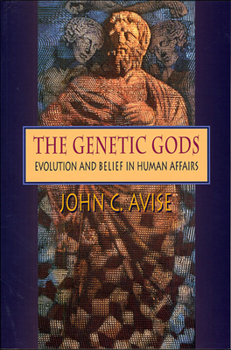The Genetic Gods: Evolution and Belief in Human Affairs
Select Format
Select Condition 
Book Overview
They mastermind our lives, shaping our features, our health, and our behavior, even in the sacrosanct realms of love and sex, religion, aging, and death. Yet we are the ones who house, perpetuate, and give the promise of immortality to these biological agents, our genetic gods. The link between genes and gods is hardly arbitrary, as the distinguished evolutionary geneticist John Avise reveals in this compelling book. In clear, straightforward terms,...
Format:Paperback
Language:English
ISBN:0674005333
ISBN13:9780674005334
Release Date:May 2001
Publisher:Harvard University Press
Length:288 Pages
Weight:2.35 lbs.
Dimensions:0.8" x 6.1" x 9.3"
Customer Reviews
2 ratings
Musings on Selfish Genes
Published by Thriftbooks.com User , 17 years ago
John Avise presents a review of contemporary molecular biology which is quite accessible to the 'lay' reader with some prior exposure to the general area of evolutionary-genetics. The discussions are somewhat philosophically charged (i.e. they do not remain necessarily technical) and touch upon social, emotional, and theological issues too. However, there is no attempt at actively engaging the theistic implications of modern genetics; the book remains focussed on the biological & behavioural aspects. Avise basically elaborates on notion of the "Selfish Gene" which seeks to 'immortalize' itself by using individuals as 'ephemeral' vehicles for perpetuation. Using this point of view, the book reviews the basic doctrines of genetics & evolution, the genesis & replication of life/genes, genetic disorders & benefits, gene replication strategies (including sexual reproduction & death), nature vs. nurture issues, and gene-therapy. Avise's style is engaging, clear, & succint - and never pedantic. The accompanying glossary is very useful for non-biologists to fallback onto when reading the more technical sections. I only wish that the notes for each chapter had been foot-notes rather than being located to the end of the book (but this is a purely personal preference). Overall I definitely recommend this book to anyone interested in acquainting herself with recent advances in molecular biology, evolutionary genetics, and genetic engineering - and its implication to modern human thought, philosophy, and civilization.
Engaging exploration of genetics and attendant ethical issue
Published by Thriftbooks.com User , 23 years ago
John Avise's engaging book is both an overview and an introduction to recent genetic research as well as an assessment of the social, ethical and religious ramifications stemming from our manipulation of the genetic code. The terminology is a little formidable in spots, and there is perhaps more genetics being explained here than most general readers would want, but these are minor obstacles when one considers the reward: listening to an expert talk about what's happening in genetics today while considering the implications. I was very impressed with Avise's level-headed and balanced assessment of the controversies. This is a sophisticated book, deeply considered and carefully expressed.The author is the distinguished Professor of Genetics at the University of Georgia and an evolutionary biologist who really knows his stuff. "The genetic gods" in the title is a metaphor of course--he even refers jokingly to "protein angels" on page 208--his point being that we are to some very real extent at the whims of our genes, just as the Greeks once thought they were at the whims of the gods on Mount Olympus. However don't imagine that Avise is presenting a genetic-centered reductionist approach in this book. He wants to emphasize that the genes are subtly, and sometimes not so subtly, influencing our lives, but that is far from the whole story. Avise suggests that the proper way to look at the culture verses genes debate is to think of culture as an "epigenetic phenomenon...itself a product of biological evolution," and that "genes and culture coevolve" (pp. 158-159). The environment shapes us, but we in turn condition the environment. As Avise expresses it, "the individual's mind to a considerable extent creates itself through the environments it conditions" (p. 159). In our attempt to understand how the mind works and to account for human behavior, Avise's states that a "myopically reductionist approach that neglects multiple levels of biological, personal, and social causation" is inadequate, as are "uncritical holistic approaches alone" (p. 165).This just makes sense and it also makes moot the sometimes heated "culture verses genetics" debate, which is similar to the old "nature verses nurture" false dichotomy. Quite simply, how can we separate the effects and influence of the environment and culture from that of the genes, and vice versa? Professor Avise does not shy away from a position on whether we should intervene genetically when something is amiss. While some people believe that "developing embryos are governed by intelligent and caring supernatural forces," Avise insists that "they are governed by natural gene-environment interactions that unfortunately can" go horribly awry as in the Lesch-Nyhan syndrome or in Down's syndrome (p. 199). In such cases, he asks, "Should we then take the reins?" His careful answer on the next page is yes, but with the understanding that "the interests of the individuals most closely involved...shoul






